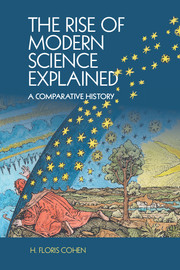Book contents
- Frontmatter
- Contents
- Introduction: the Old World and the New
- 1 To begin at the beginning: nature-knowledge in Greece and China
- 2 Islamic civilisation and medieval and Renaissance Europe
- 3 Three revolutionary transformations
- 4 A crisis surmounted
- 5 Expansion, threefold
- 6 Revolutionary transformation continued
- Epilogue: a look back and a look ahead
- Timeline 1: pre-1600
- Timeline 2: 1600–1700
- A note on the literature
- Provenance of quoted passages
- Index
2 - Islamic civilisation and medieval and Renaissance Europe
Published online by Cambridge University Press: 05 March 2016
- Frontmatter
- Contents
- Introduction: the Old World and the New
- 1 To begin at the beginning: nature-knowledge in Greece and China
- 2 Islamic civilisation and medieval and Renaissance Europe
- 3 Three revolutionary transformations
- 4 A crisis surmounted
- 5 Expansion, threefold
- 6 Revolutionary transformation continued
- Epilogue: a look back and a look ahead
- Timeline 1: pre-1600
- Timeline 2: 1600–1700
- A note on the literature
- Provenance of quoted passages
- Index
Summary
I shall chart the successive transplantations of Greek nature-knowledge by way of a metaphor. Or, rather, let us extend in a literal sense our image of transplantation. Imagine that in Greece a flowering shrub, an oleander for example, has been sown and carefully cultivated. Centuries later the nursery goes bankrupt. The administrators (in this case the rulers and scholars of Byzantium) are not particularly concerned whether the plant has withered or not but luckily it can survive for centuries without water. However, if it is to recover fully, cuttings will have to be taken and it will certainly need repotting. Also, customers will need well-tilled land in which the cuttings can take root, as well as compost to help it to blossom.
On three occasions, a customer did come to the door and, in each case, his land had been thoroughly ploughed and prepared. However, the ploughing had been done by warfare.
Warfare is obviously horrendous for the many who throughout history have been its victims. Daily routine is lost and nobody's life is safe. But, by turning everything on its head, war also creates space for change. Such change can be large-scale and at times even creative. We have seen how in the Greek world the conquests of Alexander the Great led to the founding of a cultural centre where certain pre-Socratic ideas were systematically developed into a mathematical mode of nature-knowledge.
The creative potential of warfare is evident on each occasion that cuttings are taken from Greek nature-knowledge and planted elsewhere. The first customer who came to the nursery was a caliph, some way down the family line of the prophet Mohammed. His name was al-Mansur and he came to power around the Islamic year 140 (or c. 760 AD, according to the Christian calendar which I shall keep using for the sake of convenience). His accession had not been straightforward. His family had engineered a coup and had won the civil war that ensued. He justified the coup on the grounds that he was a descendant of the prophet's uncle Abbas, and the dynasty that he founded is known accordingly as the Abbasid Caliphate. Determined to make a fresh start, he began by founding a new capital city of Baghdad on the model of Alexandria. The similarity went much further than its grid street plan.
- Type
- Chapter
- Information
- The Rise of Modern Science ExplainedA Comparative History, pp. 51 - 101Publisher: Cambridge University PressPrint publication year: 2015



